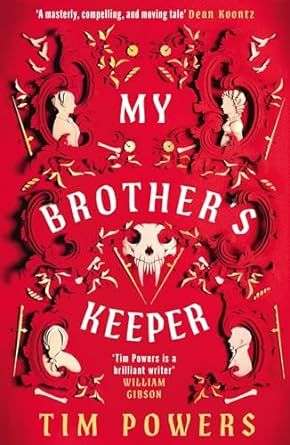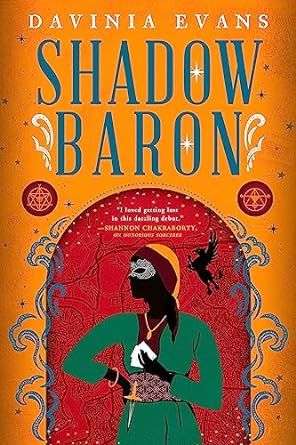We’ve implemented some new protocols around sending us messages via this website. Please email website “at” britishfantasysociety “dot” org for any issues.

For all things fantasy, horror, and speculative fiction
-
Announcement:

Shadow Baron
SHADOW BARON by Davinia Evans.
Orbit Books. p/b. £9.99.
Reviewed by Elloise Hopkins.

Two months have passed since Siyon – now Sorcerer Velo – saved the prefect’s son and lost Izmirlian Hisrani. He dreams of one day seeing Izmirlian again, but his dreams become stranger, and now one of the city’s Barons, Midnight, to be precise, seems to have a vested interest in Siyon’s actions.
Also with a vested interest in Siyon is Bezim’s Council, and in particular, Izmirlian’s brother, who is determined to stop the sorcerer in his tracks. But Siyon is the Power of the Mundane now. He rebalanced the planes and gained magic that he barely understands. Along with it came beings from elsewhere, visiting the mundane in the same way that Siyon himself used to travel to other planes to procure alchemical items. So it falls on Siyon to fix things, but as usual, he has no real idea how to use the power he possesses. He has no choice but to try and learn as he goes.
Zagiri Savani is determined to find a place on the Council. A clerk’s position has opened up, which could be her first step to making real changes in the city. She will not let her social position hold her back. Elsewhere, her sister, Anahid, is still gambling. With the same level of determination as Zagiri, she will meet Stepan Zinedani at the table. This time, has she taken on more of the Flower district than she can handle?
Shadow Baron resumes Siyon’s narrative two months after events in Notorious Sorcerer, and Siyon has certainly become a notorious sorcerer. He holds all the magic of the mundane, has a vicious demon by his side, and now a Council that demands immediate action. He and Anahid bring themselves to the attention of the city Barons, and that may not be a good thing.
The middle of a trilogy can so often become solely an assembling of pieces ready for the finale. Not in this second book in The Burnished City series. There is no doubt that Evans has ensured no compromise to the pace, action or worldbuilding, all of which are as present and as strong as they were in the debut. Story arcs are introduced and followed through, holding the reader’s attention throughout, and like the first book, the climax steps up a gear, ready for the last.
Characterisation remains the main strength here. A host of new supporting characters brings the city to life. Each is well-rounded, with their own motives and secrets, but Anahid’s character is the true stand out. She comes into her own as she takes on a large part of the point of view narrative and immerses herself fully into her second life. The demands on her time, both as a member of the azatani and her actions in the city’s darker district, are written with appropriate underlying tension, and her struggles and frustrations are felt by the reader.
Explore the blog:
Blog categories:
Latest Posts:
Tags:
#featured (56) #science fiction (25) Book Review (264) events (44) Fantasy (231) Graphic Novel (13) horror (136) Members (62) Orbit Books (48) profile (43) Romance (17) Science Fiction (50) short stories (28) Titan Books (52) TV Review (15)
All reviews
Latest Reviews:
- THE HOUSE ON THE BORDERLAND by William Hope Hodgson
- Monstrum by Lottie Mills
- Mood Swings by Dave Jeffery
- Yoke of Stars by R.B. Lemberg
- Hera by Jennifer Saint
- The Black Bird Oracle by Deborah Harkness
- RETURN OF THE DWARVES By Markus Heitz
- Delicious in Dungeon
- Toxxic by Jane Hennigan
- THIS ISLAND EARTH: 8 FEATURES FROM THE DRIVE-IN By Dale Bailey
Review tags:
#featured (2) Action (4) Adventure (4) Book Review (28) Fantasy (18) Featured (2) Feminist (2) Gothic Horror (3) Horror (14) Magic (3) Orbit Books (3) Romance (6) Science Fiction (5) Swords and Sorcery (2) Titan Books (7)